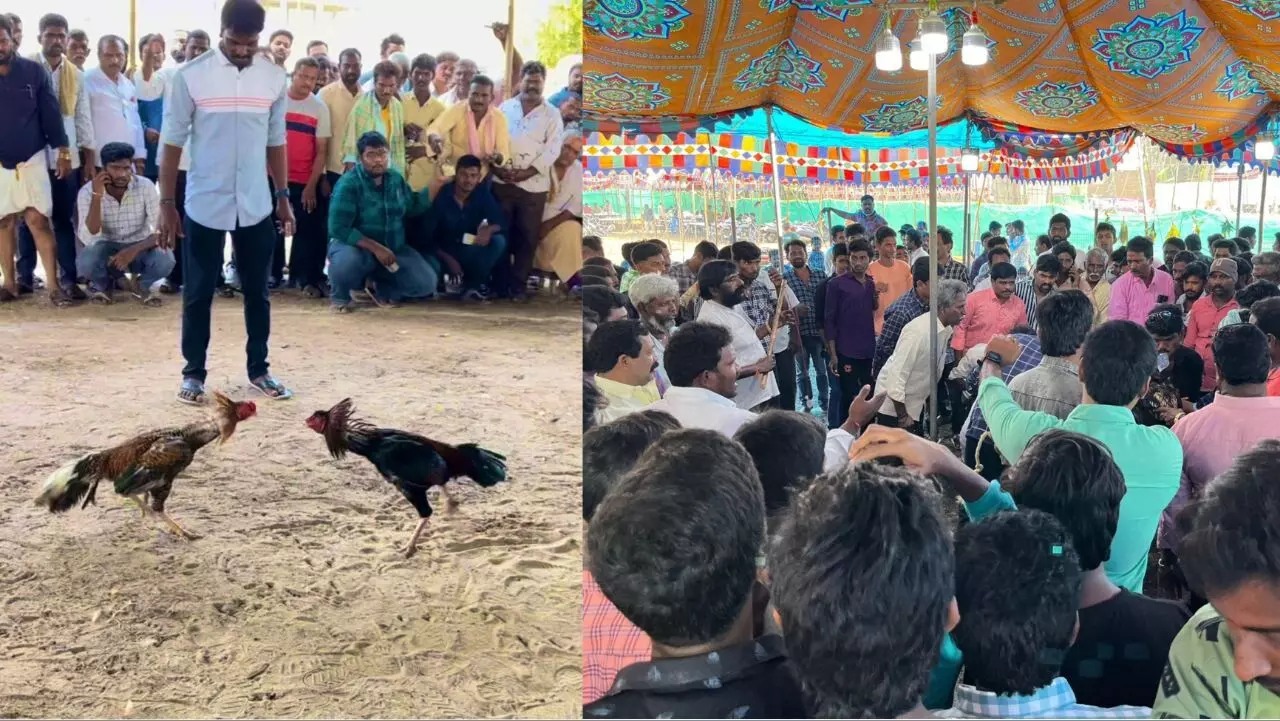Rooster fights return to Andhra streets during 3 days Sankranti gaiety despite ban
This might surprise you, but there is even a book named ‘Kukkuta Satra’ which lists downs the techniques and diet for roosters being prepared to fight.
By Bhaskar Basava
Amaravati: As the nation celebrated Sankranti in full fervour after years of Covid lull, the Telugu states observed the festival in its full glory. With minimal restrictions, people gathered in huge numbers across the state to rejoice in the festivities.
The celebrations were different this time as the roosters returned to the streets of Andhra Pradesh to mark a show of strength. Despite a ban imposed by the Supreme Court, local political leaders of all parties organised rooster fights. It continues to be an open secret in the state—politicians, landlords, and local power bearers are usually the ones who organise such events to influence people.
The situation was the same this time as well. They threw in massive money and wooed participants with floodlights, banners, and special arrangements. All local restaurants and hotels in the coastal areas of Andhra Pradesh witnessed a massive rush for three days. Participants from across the state flooded coastal Andhra only to witness the rooster fights which predominantly happen in the Godavari belt. Several participants also came from the neighbouring states of Telangana and Karnataka.
Special fighting arenas were arranged in Bhimavaram, Gannavaram, Rajahmundry, and other key areas of the coastal region. These hubs also witnessed participation from senior politicians, wealthy businessmen, NRIs, and film actors.
How rooster fighting became part of the Telugu culture
The history of rooster fighting goes back to the Indus valley civilization. It spread across India, China, Persia, and eastern countries. Since a long time, across India, rooster fights have been adopted as a sport and it is predominantly followed in coastal Andhra Pradesh.
The reason behind rooster fighting’s influence in coastal Andhra was its richness in agricultural produce and domination of farmers. The farmers used to participate in the fights to project the capabilities of their pet hens and bulls during the harvest festival Sankranti. But now, the sport has become a source of entertainment for people and has lost its cultural significance.
Due to the involvement of gambling, as per locals, as much as Rs. 1,000 crore circulates in the market via gambling during Sankranti.
On being asked about the significance of the festival, a rooster fight organiser, Satish, told NewsMeter, “Wherever we might be, all of our family members meet during these three days. It is our responsibility to respect and continue the tradition that has been transferred by our forefathers. Rooster fights are a part of Sankranti. Without it, there is no Sankranti,” he said.
Insight to rooster games
There are almost 50 breeds that have been deemed fit for rooster fighting. However, there are 5–10 breeds—Dega, Nemali, Kaki, Setu, and Parla. The breed name is indicative of the rooster’s indigenous fighting skills. This might surprise you, but there is even a book named ‘Kukkuta Satra’ which lists downs the techniques and diet for roosters being prepared to fight.
The cost of the high fighting hen breed ranges from ₹25,000 to ₹2,00,000. The height, weight, and length of the tail of the rooster also play a key factor on the price of the rooster breed. An unofficial estimate suggests each event organiser collects at least a crore within three days.
Along with the roosters, there are casinos and card games that attract young men as well as the aged. The organisers also make arrangements for VVIPs and VIPs. These people also have direct access to the arena and get liquor and food.
Why the ban remains ineffective
Rooster fights were banned under the Prevention of Cruelty to Animals Act in 1960. The courts again upheld the ban in 2015 and 2016. However, in 2018, the Supreme Court allowed the event. In its order, it prohibited the use of knives and banned gambling and betting on roosters.
Speaking about the inefficiency of the ban, B. Srinivas, a 60-year-old farmer, explained, “Whomsoever stays in the government makes sure that the police doesn’t trouble the locals during the event. They also make sure that the local cadre enjoys the event and doesn’t face any difficulties as it may impact their support during elections. The police, too, act in the interest of bigwigs in the region. Usually, they only file nominal cases on the last day of the event, just for the sake of it. They just do it to be safe in case someone approaches the court.”